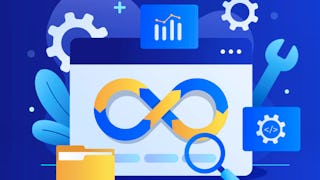Curious about how software gets built, tested, and deployed? Do you wonder how a team of multiple people work on a code base? You've heard about DevOps, but are you sure you understand what it means?
If you've wondered about these questions, this course is for you. We’ll cover the basic steps you need to take to dive into the wonderful world of DevOps and project management. In Week 1, you'll learn about the definition and characteristics of a project. We will introduce project management best practices, including how to justify your project, developing a project summary and a project plan. The week will conclude with an overview of all phases of the software development lifecycle. The course continues with an overview of the pitfalls and perils of working without project management principles. We'll then introduce common project frameworks such as waterfall, agile, scrum and kanban. In Week 3, we'll define a Continuous Integration/Continuous Development pipeline, introduce source control and get hands-on by learning how AWS CodeCommit and AWS CodeBuild can help you when it is time to build. The course closes by highlighting the importance of testing and the various types of testing to consider. You'll learn when to deploy code and the different strategies that are available. A closing exercise will have you interacting with Cloud 9, CodeCommit, CodeBuild, CodeDeploy, CodePipeline.
















